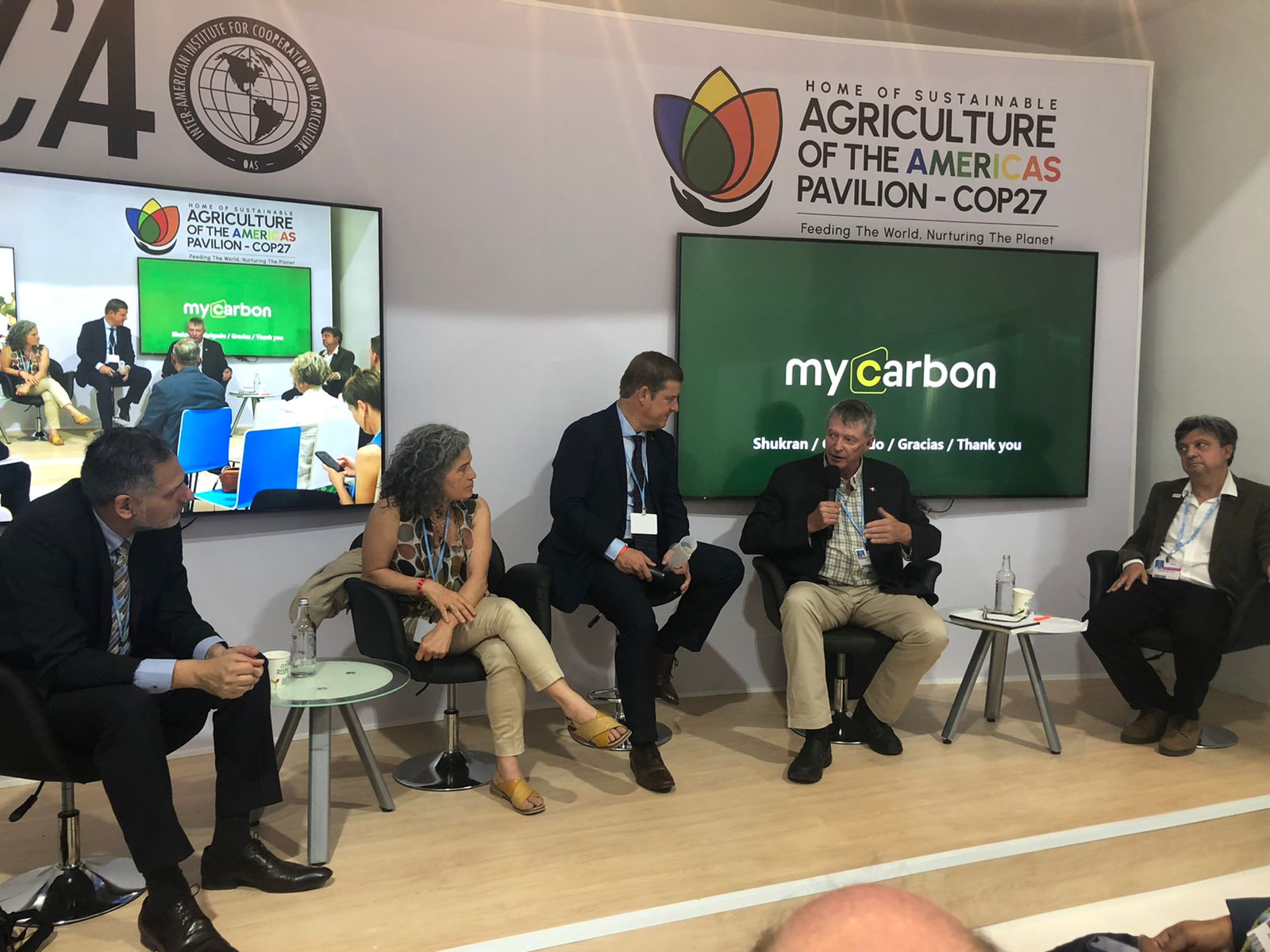During an event that placed sustainable agriculture at the top of the COP27 agenda, farmers, ranchers and public sector representatives from the Americas highlighted the good environmental practices applied by the agriculture sector, which guarantees global food security. They also reaffirmed the key role of science in developing pro-nature policies in the region.

Sharm El Sheik, Egypt, 9 November 2022 (IICA) – During an event that placed sustainable agriculture at the top of the COP27 agenda, farmers, ranchers and public sector representatives from the Americas highlighted the good environmental practices applied by the agriculture sector, which guarantees global food security. They also reaffirmed the key role of science in developing pro-nature policies in the region.
The stakeholders gathered at the Home of Sustainable Agriculture of the Americas pavilion, which the Inter-American Institute for Cooperation on Agriculture (IICA) set up in the Egyptian city of Sharm El Sheik, where the 27th Conference of the Parties to the UN Framework Convention on Climate Change (COP27) is being held. They reaffirmed the commitment of the agriculture and livestock sector in the Americas to regenerative practices that protect soils and other natural resources, and to a type of production that seeks to reduce carbon emissions to zero.
The event “Climate-smart production systems: Nature-based solutions and farmers’ key role” was organized by several emblematic entities in Argentina: the Argentine Association of Direct Seeding Producers (AAPRESID), the Group of Producing Countries from the Southern Cone (GPS) and the Argentine Association of Regional Agricultural Experimentation Consortia (AACREA). These large networks bring together agricultural producers who are committed to innovation, interested in soil development and conservation, and who have adopted and promoted the dissemination of a new agricultural paradigm based on direct seeding.
Speakers included Marcelo Torres, Vice-President of AAPRESID; Bob Lowe, President of the Canadian Cattlemen’s Association; Cecilia Jones, Coordinator of the Sustainability and Climate Change Unit of the Ministry of Livestock, Agriculture and Fisheries of Uruguay; and Eduardo Bastos, CEO of My Carbon, a Minerva Foods company.
Cristian Feldkamp, Executive Director of AACREA, moderated the event, which was opened by IICA Director General Manuel Otero.
In attendance at the event were representatives of producer organizations from the United States, Brazil, Uruguay and Argentina, among other countries; the Ambassador of Argentina to Egypt, Eduardo Varela; and the President of the Canadian Federation of Agriculture.
In welcoming the participants, Otero stressed the importance of the Americas in guaranteeing food for humanity. He noted that “we are making substantial contributions to addressing climate change, and we must demonstrate this with pride and strength, recognizing that our agrifood systems are by no means flawed, but can be perfected”. He also said that COP27 must be “the COP of agriculture” and expressed his pride “at the fact that the Home of Sustainable Agriculture of the Americas is hosting these discussions on the future of agriculture, a key and strategic activity. We are pro-nature producers; we are a united voice for the continent, and we must further strengthen our role”.
Marcelo Torres of AAPRESID noted that “we implement strategies aimed at keeping soils alive, utilizing water resources more efficiently, reducing the dependence on synthetic inputs and maximizing carbon sequestration. Argentina is already a benchmark for soil care, erosion control, technology use and agricultural innovation. We can position ourselves as leaders of an agriculture sector that is capable of adapting to climate change and contributing to its mitigation”.
“We understand the challenges at hand and are the first to respond, given our social responsibility. The Canadian beef industry is eager to share its remarkable track-record of sustainability, which emphasizes the connection between cattle-raising and the environment. We have improved our level of involvement in conversations about the environment and climate change, and will continue to share the ways in which we form part of the solution”, said Lowe.
Cecilia Jones, in turn, highlighted Uruguay’s efforts to transform science into public policies that allow for producing in a more environmentally friendly manner. “It’s not just about reducing emissions. Uruguay has strong policies and sustainable production. Our policies are based on science and serve to protect soils. They are simple rules that provide guidance on how to produce. We work with producers and the academic sector to develop consistent policies”. The Uruguayan official also cited the challenges posed by climate change, which have an impact on production.
Eduardo Bastos emphasized the importance of, at the end of the day, capitalizing on sustainable production in the Americas. “We can do more: offer solutions and sequester increasing amounts of carbon. We can do what many cannot. We have a great opportunity to replicate this in supermarkets, with food traceability. It is possible to eat steak or wear leather with zero emissions, and we know that we are the world’s greatest food basket”, said Bastos.
The Home of Sustainable Agriculture of the Americas is a pavilion that IICA has erected at COP27 and is a space devoted to sustainable agriculture and the agrifood systems of the Americas. It showcases the key role of the agriculture sector in providing climate solutions and global food security, while also highlighting the contributions of producers and other sector stakeholders in climate change adaptation and mitigation.
Since COP27 began, senior Latin American officials, as well as representatives from the private sector and international organizations have been visiting and participating in activities at the pavilion, which is operating under the slogan: “Feeding the World, Nurturing the Planet”. The structure is located in the Sharm el-Sheikh International Convention Center – the epicenter of the global climate summit.
The Home of Sustainable Agriculture of the Americas has 26 strategic partners from various sectors, including production sector players, such as the United States Dairy Export Council (USDEC) and Protein Pact; key IICA private sector partners in the Living Soils of the Americas initiative, such as Bayer, Syngenta and Pepsico, as well as organizations from the crop science industry, such as CropLife International, among others.
More information:
Institutional Communication Division.
comunicacion.institucional@iica.int










